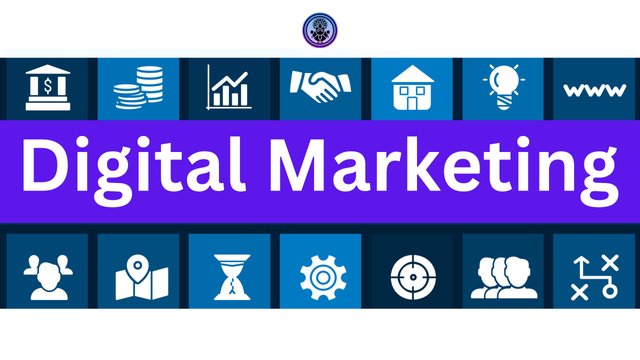Digital marketing
Digital marketing refers to the use of digital channels, platforms, and technologies to promote products, services, or brands to a targeted audience. It encompasses a wide range of strategies and tactics designed to reach consumers through online mediums, leveraging the internet and electronic devices. Here’s an overview of digital marketing:

Key Components of Digital Marketing
Search Engine Optimization (SEO):
- SEO involves optimizing a website’s content and structure to rank higher in search engine results pages (SERPs). The goal is to increase organic (non-paid) traffic from search engines like Google.
Content Marketing:
- Content marketing focuses on creating and distributing valuable, relevant, and consistent content to attract and engage a target audience. Examples include blog posts, articles, videos, infographics, and eBooks.
Social Media Marketing:
- This involves using social media platforms (like Facebook, Instagram, Twitter, and LinkedIn) to promote products, engage with customers, and build brand awareness. Social media marketing includes both organic activities (unpaid posts) and paid advertising.
Email Marketing:
- Email marketing is the process of sending targeted emails to prospects and customers to nurture relationships, promote products, and drive conversions. It is highly effective for lead generation and customer retention.
Pay-Per-Click (PPC) Advertising:
- PPC advertising allows marketers to place ads on search engines and other platforms, paying a fee each time the ad is clicked. Google Ads and Bing Ads are popular PPC platforms.
Affiliate Marketing:
- This involves partnering with other businesses or individuals (affiliates) who promote your products in exchange for a commission on sales generated through their referral links.
Influencer Marketing:
- Leveraging influencers—people with a large and engaged following on social media or other platforms—to promote your products. Influencer marketing can increase brand credibility and reach.
Online Public Relations (PR):
- Online PR involves building relationships with digital media outlets, bloggers, and influencers to gain publicity and improve brand visibility. This can include press releases, guest blogging, and media outreach.
Conversion Rate Optimization (CRO):
- CRO focuses on improving the effectiveness of a website or landing page to increase the percentage of visitors who complete a desired action, such as making a purchase or filling out a form.
Analytics and Data Analysis:
- Digital marketing relies heavily on data to measure performance, understand customer behavior, and make informed decisions. Tools like Google Analytics, social media insights, and CRM systems are used for tracking and analysis.
Benefits of Digital Marketing
Global Reach:
- Digital marketing enables businesses to reach a global audience, transcending geographical boundaries.
Cost-Effective:
- Compared to traditional marketing methods, digital marketing can be more affordable, offering a higher return on investment (ROI).
Targeted Advertising:
- Marketers can target specific demographics, interests, and behaviors, ensuring that their message reaches the right audience.
Measurable Results:
- Digital marketing allows for precise measurement of campaign performance through analytics and tracking tools, enabling continuous optimization.
Personalization:
- Digital marketing enables personalized communication with customers, tailoring messages and offers to individual preferences and behaviors.
Engagement:
- Digital marketing facilitates direct interaction with customers through social media, email, and other channels, fostering stronger relationships and customer loyalty.
Challenges of Digital Marketing
Competition:
- The digital landscape is highly competitive, with numerous businesses vying for the same audience’s attention.
Constantly Evolving Technology:
- Keeping up with the rapid pace of technological advancements and algorithm changes can be challenging.
Data Privacy and Security:
- Ensuring data privacy and security is critical, especially with increasing regulations like GDPR and CCPA.
Content Overload:
- With a vast amount of content being produced daily, standing out and capturing the audience’s attention can be difficult.
Skill Gap:
- Effective digital marketing requires a diverse set of skills, and finding or training personnel with the necessary expertise can be challenging.
Digital marketing is an essential component of modern business strategy, offering numerous opportunities to reach and engage with a global audience. By leveraging various digital channels and tools, businesses can effectively promote their products, build brand awareness, and drive conversions. However, to succeed in the ever-evolving digital landscape, marketers must stay informed about the latest trends and technologies, continuously optimize their strategies, and address the challenges associated with digital marketing.